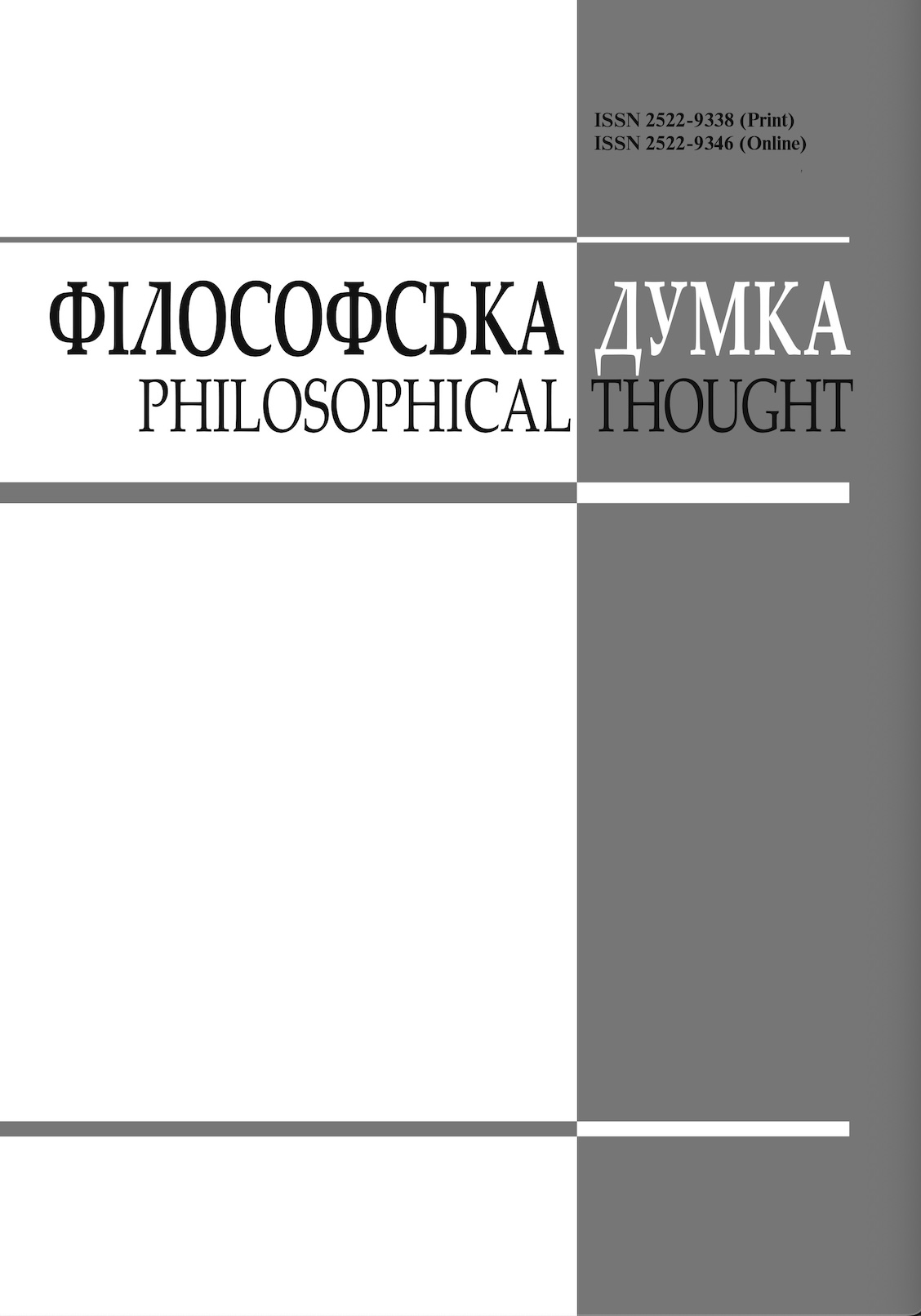TWILIGHT OF METAPHYSICS: THE PROBLEM OF NOTHINGNESS AND NIHILISM IN THE MARTIN HEIDEGGER’S PHILOSOPHY
DOI:
https://doi.org/10.15407/fd2024.04.020Keywords:
Nothingness, nihilism, Being, ontology, metaphysics, fear, human existence, transcendence, essence, Heidegger, Nietzsche, history of philosophyAbstract
The article examines the problem of Nothingness and nihilism in Martin Heidegger’s views. In his early studies, Nothingness appears as a negation in the logical judgement. However, in further examinations, it relates to human existence. Nothingness is exposed in realization of the finitude of human life and death. Heidegger explains that human existence and Nothingness are connected through the experience of fear. To be fearful does not mean to be afraid of certain things, but to be able to see the perspective of non-existence. Nothingness that emerges in fear resembles transcendence, in other words, the ability to go beyond one’s own limits. Going outside the limitations of existence allows anyone to overcome the passiveness of life and start being concerned about one’s own existence. As a result, Heidegger’s philosophy of Nothingness was named nihilistic. However, Heidegger rethinks the problem of nihilism in the context of Nietzsche’s philosophy. He succeeds in showing that Nietzsche avoids the problem of Nothingness. In the Nietzschean vision, Nothingness is a characteristic of a world in which values are an appeal not to the earthly, but to the afterlife existence. That is why Nietzsche speaks of the need for a new set of values. Therefore, according to Heidegger, Nietzsche does not ask about the essence of Being, but simply assigns values to Being. Instead, in Heidegger’s philosophy, nihilism is a consequence of Western metaphysics ignoring the question of Nothingness. It is due to Nothingness that the question of Being becomes clear: without thinking of Nothingness, Being is not understood either. One can change the situation by asking again about Nothingness and Being. In general, the problem of nihilism in Heidegger’s philosophy changes significantly. First, he connects it with the historical movement of forgetting of Being, and later with a false interpretation of the essence of metaphysics. This thought is strengthened by the tendency of the dominance of technology, which dehumanizes the world. In conclusion, Heidegger’s philosophy is comparable to prophetism. Like Nietzsche, he seeks salvation from nihilism in art: poetry liberates from calculative rational thinking. Therefore, the question of the essence of thinking has not yet been raised in the West. The dominance of metaphysical thinking further distances a human from Being. At the same time, Heidegger insists on including the problem of Nothing in the question of Being, as ignoring it prevents the real overcoming of nihilism.
References
Baker, G. (2018). Nihilism and Philosophy. Nothingness, Truth and World. London. New York, New Delhi, Sydney: Bloomsbury Academic.
Beikvell, S. (2023). In the Cafe of Existentialists: Freedom, Existence and Apricot Cocktails. [In Ukrainian]. Kyiv: Komubuk.
Costea, B., Amiridis, K. (2011). The Movement of Nihilism as Self-Assertion. In: Movement of Nihilism. Heidegger's Thinking After Nietzsche. Ed. by Hemming, L., Amiridis, K., Costea, B. (pp. 8-24). New York: Continuum.
Gertz, N. (2019). Nihilism. Cambridge, MA: MIT Press.
https://doi.org/10.7551/mitpress/11773.001.0001
Haidegger, M. (1996). Why Poets? [In Ukrainian]. In: Word. Sign. Discourse. An Anthology of World Literary and Critical Thought of the 20th Century (pp. 180-197). Lviv: Litopys.
Heidegger, M. (1978). Die Lehre vom Urteil im Psychologismus. Ein kritisch-positiver Beitrag zur Logik. In: Frühe Schriften (1912-1916). Heidegger Gesamtausgabe: Band 1 (SS. 59-188). Frankfurt am Main: Vittorio Klostermann.
Heidegger, M. (1996). Nietzsche I. Heidegger Gesamtausgabe: Band 6.1. Frankfurt am Main: Vittorio Klostermann.
Heidegger, M. (1997). Nietzsche II (1939-1946). Heidegger Gesamtausgabe: Band 6.2. Frankfurt am Main: Vittorio Klostermann.
Heidegger, M. (1967). Sein und Zeit. Tübingen: Max Niemeyer Verlag.
Heidegger, M. (2004a). Was ist Metaphysik? In: Wegmarken (1919-1961). Heidegger Gesamtausgabe: Band 9 (SS. 103-122). Frankfurt am Main: Vittorio Klostermann.
https://doi.org/10.5771/9783465141839-103
Heidegger, M. (1999a). Das Wesen des Nihilismus. In: Metaphysik und Nihilismus. Heidegger Gesamtausgabe: Band 67 (SS. 175-258). Frankfurt am Main: Vittorio Klostermann.
Heidegger, M. (1999b). Die Überwindung der Metaphysik. In: Metaphysik und Nihilismus. Heidegger Gesamtausgabe: Band 67 (SS. 5-174). Frankfurt am Main: Vittorio Klostermann.
Heidegger, M. (2004b). Zur Seinsfrage. In; Wegmarken (1919-1961). Heidegger Gesamtausgabe: Band 9 (SS. 385-427). Frankfurt am Main: Vittorio Klostermann.
Hodge, J. (2011). Heidegger on Virtue and Technology: The Movement of Nihilism. In: Movement of Nihilism. Heidegger's Thinking After Nietzsche. Ed. by Hemming, L., Amiridis, K., Costea, B. New York: Continuum.
Kelly, D. (2022). Beyond Nihilism: The Turn in Heidegger's Thought from Nietzsche to Hölderlin. London: Bloomsbury Academic.
https://doi.org/10.5040/9781350133785
Lyuty, T. (2002). Nihilism: The Anatomy of Nothingness. [In Ukrainian]. Kyiv: Parapan.
Possenti, V. (2014). Nihilism and Metaphysics. The Third Voyage. State University of New York Press.
https://doi.org/10.2307/jj.18255238
Rius, Zh. (1998). Progress of Modern Ideas. Prospect of the Newest Science. [In Ukrainian]. Kyiv: Osnovy.
Safranski, R. (2001). Ein Meister aus Deutschland. Heidegger und seine Zeit. Frankfurt am Main: Fischer Verlag.
Tartaglia, J. (2016). Philosophy in a Meaningless Life. A System of Nihilism, Consciousness and Reality. London, New York, New Delhi, Sydney: Bloomsbury Academic.
https://doi.org/10.5040/9781474247696
Weller, S. (2011). Modernism and Nihilism. London: Palgrave Macmillan.
Downloads
-
PDF (Українська)
Downloads: 223
Published
How to Cite
Issue
Section
License
Authors who publish with this journal agree to the following terms:
- Authors retain copyright and grant the journal right of first publication.
- Authors are able to enter into separate, additional contractual arrangements for the non-exclusive distribution of the journal's published version of the work (e.g., post it to an institutional repository or publish it in a book), with an acknowledgement of its initial publication in this journal.
- Authors are permitted and encouraged to post their work online (e.g., in institutional repositories or on their website) prior to and during the submission process, as it can lead to productive exchanges, as well as earlier and greater citation of published work (See The Effect of Open Access).


